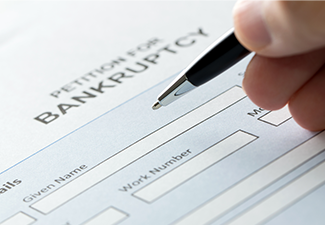Preparing for Bankruptcy
July 20, 2023
 When you’ve finally come to the decision to file for bankruptcy, you’ll need to take certain steps to prepare. Keep in mind that while it’s essential to know what to do when preparing for bankruptcy, it’s equally as important to know what not to do before bankruptcy. Working with a qualified bankruptcy attorney is one of the best steps you can take to ensure you’re ready for the entire process.
When you’ve finally come to the decision to file for bankruptcy, you’ll need to take certain steps to prepare. Keep in mind that while it’s essential to know what to do when preparing for bankruptcy, it’s equally as important to know what not to do before bankruptcy. Working with a qualified bankruptcy attorney is one of the best steps you can take to ensure you’re ready for the entire process.
If you’re considering bankruptcy and want to learn more about what you should be doing now to minimize the negative effects and maximize the benefits, reach out to us at Kinnaird Law Firm. With over 100 years of combined legal experience, our attorneys are proud to represent bankruptcy clients in Colorado Springs, Colorado, and throughout Douglas County and El Paso County. Set up a consultation with us today.
What To Do To Prepare for Filing Bankruptcy
Make Sure You Have Filed Required Tax Returns: Tax returns are used to determine and verify your past income and assets. Completed returns are also required for both Chapter 7 and Chapter 13 filers if they want to pursue having any past income tax discharged.
Pay Off Necessary Bills: Even though much of your debt will be discharged after your filing has been approved by a judge, you should still continue to pay daily living bills such as rent, utilities, or a cell phone bill. Past-due utilities and rent may be written off, but you will still be responsible for paying these while your case is being processed and after it’s completed.
Stop Automatic Payments: Many people take advantage of auto-pay for regular bills, but you should stop these as soon as you can. It’s common for these requests to take several days, if not weeks, to go through. You don’t want payments being withdrawn from your accounts accidentally after the automatic stay is in place.
Document Debt Information Honestly and Thoroughly: Never attempt to lie to or mislead your attorney or the judge about your finances. It’s essential that all the information you provide is accurate and that you’re not leaving out anything.
What Not To Do Prior To Filing Bankruptcy
Don’t Pay Debts That Would Be Dischargeable: Most consumer debt will be discharged when filing for bankruptcy which includes credit card debt, personal loans, medical bills, or past due rent and utilities. If you know you’re going to declare bankruptcy, you should not pay anything toward these or use assets to pay these that will be protected from liquidation.
Don’t Wait Until a Creditor Has Won a Judgment: Once your bankruptcy claim has been received by the courts, an automatic stay will be put into place which should stop all creditors from contacting you to collect on past-due debt. However, sometimes creditors won’t get the notice or will ignore it and continue to make requests. You do not need to pay them at this time and you do not need to wait for your judgment to come through. If you need help dealing with creditors, contact your attorney.
Don’t Use Retirement Accounts to Pay Debts: In most cases, money that is kept in a retirement account will be exempt from the liquidation required of Chapter 7 bankruptcy. Therefore, you shouldn’t touch these assets in the weeks and months leading up to your filing and you should never use them to pay down other debts.
Don’t Acquire New Debt: Do not apply for any new loans or lines of credit. Additionally, you should also limit the amount you use of any current lines of credit. If you have to use your credit card 60 to 90 days before your filing goes through, it should only be for essential expenses like groceries or rent.
Don’t Move Assets (Transfer Funds or Property): As much as you can, keep all of your accounts as they are, and don’t move assets from one account to another or transfer funds or property to another person. If you do, a judge may interpret this act as your attempt to hide assets.
Don’t Selectively Pay Off Some Loans: If you are paying down some loans before filing, you shouldn’t hand-select any ones in particular. This is especially true of any loans you’ve taken out from friends or family members if it means you’re ignoring larger debts like student loans or back taxes.
How Legal Counsel Can Help
While no one is technically required to use a lawyer to file for bankruptcy, it’s highly recommended you do so. An experienced attorney can:
Assess your situation
Help you determine the best course of action based on your needs and goals
File the appropriate forms with the court and address any inconsistencies
Represent you if you need to appear in court
Guiding You Through the Bankruptcy Process
You shouldn’t have to go through the bankruptcy process alone. If you’d like to consult with a skilled bankruptcy lawyer in the Colorado Springs area—or anywhere else in Colorado—reach out to us at Kinnaird Law Firm.
